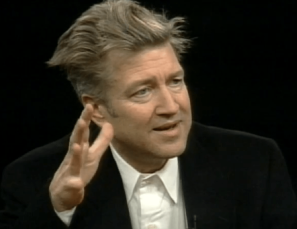 Something that David Lynch revealed in 2000 on the Charlie Rose show always stuck out to me. Barring vacations, he eats the same meals everyday: tuna with tomatoes, feta cheese, and olive oil for lunch, and chicken and broccoli with soy sauce for dinner. This way, he never has to think about that aspect of his life, allowing all his energy to be channeled into his creative work as opposed to figuring out what and where to eat everyday. This impressed me, and it seems another way that balancing structure in one area with “chaos” in another creates a sustainable balance, especially for the artist-philosopher-scientist types.
Something that David Lynch revealed in 2000 on the Charlie Rose show always stuck out to me. Barring vacations, he eats the same meals everyday: tuna with tomatoes, feta cheese, and olive oil for lunch, and chicken and broccoli with soy sauce for dinner. This way, he never has to think about that aspect of his life, allowing all his energy to be channeled into his creative work as opposed to figuring out what and where to eat everyday. This impressed me, and it seems another way that balancing structure in one area with “chaos” in another creates a sustainable balance, especially for the artist-philosopher-scientist types.
“Habit in the daily routine…and then, when there’s some sort of order there, then you’re free to mentally go off anyplace. You’ve got a safe sort of foundation and a place to spring off from.”
—David Lynch on Charlie Rose (January 12th, 2000)
“Be regular and orderly in your life, so that you may be violent and original in your work.”
—Gustave Flaubert
Lynch’s self-imposed automation fortunately works out for him. These are simple meals he likes that nourish him enough to function (of course, including his intensive coffee and cigarette intake, and daily meditation), but I think it can clue is into a lot of dysfunctional (perhaps ingrained or unconscious) self-impositions we might have in our lives. What if that meal had an allergen in it that poisoned David for decades, causing suffering that he could never connect to his diet? What if he had chosen a vegan bean-burger instead of tuna, and become protein deficient, and thus impotent, weak, and uncreative? Thankfully, tuna is an excellent protein source (though filled with mercury), and I eat chicken almost everyday as well.
“The purer the environment, the more, you know, fantastic the interior world can be — it seems to me.”
—David Lynch on Charlie Rose (January 12th, 2000)
This concept extends to all areas: macronutrient ratios, the food and chemicals we ingest or exclude, the people we interact with, our environment, movement, and light sources, our sleep, the thoughts in our heads, and our purpose, all will affect our creative and productive outputs. I know a lot of people who’ve, over decades, essentially doomed themselves to mediocrity, poverty, or even crippled themselves through misdirection, propaganda, pride, arrogance, ignorance, or sheer apathy. I think even apathy is a consequence of some physiological derangement that can be troubleshot and remedied, so each issue is cumulative, like uncovering post-avalanche rubble only after safeguarding against future avalanches.
As an example of this, I know of someone whose mysterious, chronic back pain for which they had experimented tediously with physical therapies for (inversion therapy, chiropractic, ergonomics), spontaneously disappeared when he ended his relationship with his long-term romantic partner. The stress this relationship was causing him was crippling his anatomy; just that one wrong person in our lives can act as an intense “allergen”, or more accurately, toxin. That isn’t to say that his partner is inherently toxic, but just as different metabolisms are suited to different macronutrient ratios and diet styles, so too are we compatible with certain people and others not.
“If you are sick, reconsider everything you are doing as a contributing factor.”
—Ray Peat, Nutrition For Women
Seeing the ubiquitous consequences that stress can have on different people, anecdotes like this are useful as sparks to avenues of research. Stress causes reactions in the autonomic nervous system, increasing muscle tension and pain sensitivity. Pain, in turn, increases negative emotions and association with unpleasant memories. Both of these increase cortisol, causing depression, which further increases pain sensitivity in a vicious feedback loop (Ellegaard and Pedersen, 2012). We can see the potential complexity of such a problem, but what’s impressive is that sometimes changing just one factor can break the entire cycle and remediate everything. Just because this individual’s stress preceded his back pain doesn’t mean that chronic pain is psychological—in fact, it’s more often the opposite: that chronic pain leads to stress and depression (Fishbain, et al., 1997)—it simply emphasizes the importance of looking at everything in the context of the individual, and how generalized, conventional solutions can be completely ineffective for the specific circumstances in your life that require careful consideration and analysis.
Works Cited
Eich, Eric, et al. “Affect, Pain, and Autobiographical Memory.” Journal of Abnormal Psychology, vol. 99, no. 2, 1990, pp. 174–178., doi:10.1037/0021-843x.99.2.174.
Ellegaard, Hanne, and Birthe D Pedersen. “Stress Is Dominant in Patients with Depression and Chronic Low Back Pain. A Qualitative Study of Psychotherapeutic Interventions for Patients with Non-Specific Low Back Pain of 3–12 Months’ Duration.” BMC Musculoskeletal Disorders, vol. 13, no. 1, 2012, doi:10.1186/1471-2474-13-166.
Fishbain, David A., et al. “Chronic Pain-Associated Depression: Antecedent or Consequence of Chronic Pain? A Review.” The Clinical Journal of Pain, vol. 13, no. 2, 1997, pp. 116–137., doi:10.1097/00002508-199706000-00006.
Jain, Rakesh. “Pain and the Brain.” The Journal of Clinical Psychiatry, vol. 70, no. 2, 2009, doi:10.4088/jcp.7131cc7c.e41.
Joukamaa, M. “Depression and Back Pain.” Acta Psychiatrica Scandinavica, vol. 89, no. s377, 1994, pp. 83–86., doi:10.1111/j.1600-0447.1994.tb05808.x.
